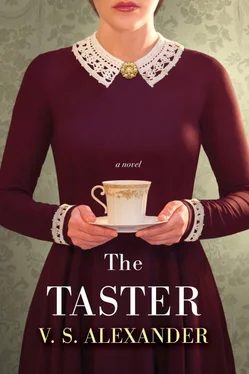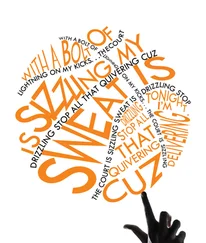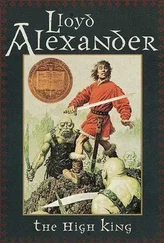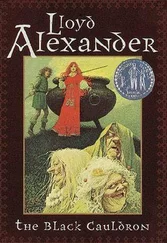Because I was a senior member of her staff, Cook assigned me to taste the evening supper. Else was to taste for lunch, also an important meal in Hitler’s schedule. I showed Else around the grounds so she’d be familiar with the greenhouses and the other buildings at the compound. We were back at the Berghof, admiring the view from the terrace, when Eva Braun showed up with her two Scotties. She remembered me and shook my hand. She and Hitler had been apart for several months and she seemed pleased to have company again. I introduced her to Else. Eva was cordial to me, but her measured tone with Else convinced me that one needed to gain Eva’s trust in order to be invited into her circle.
“I fear there will be little for you to do this year,” Eva said to us. “The Führer has ordered that any celebrations should be muted.” She sighed. “I do wish the war would end soon, so our lives could get back to normal. Adolf…” She paused, blushing from her casual use of his name. “The Führer is so absorbed in his duties that I worry about him. I don’t want him to be in a bad mood. He may not even allow a tree this year, but he’ll probably give his usual gift of chocolates to his staff.” She leaned down and petted the dogs. “At least there’s something to look forward to.” She cupped her hands around their jowls. “Right, Negus and Stasi? And our holiday teas, of course.”
“When are those?” Else asked innocently.
Eva laughed, straightened up and drew together the lapels of her fur coat. “Oh, they’re not for you. They’re for the invited guests of the Führer. I imagine you’ll be the tasters for them.”
After a stiff good-bye, she turned and walked away, leaving Else and me in the sun.
“Who was that woman?” Else asked.
“A companion of the Führer’s. She rules the Berghof. Keep on her good side.”
We walked back to our room. Something had struck me as Eva talked to us—Hitler’s teas. How better to poison the Führer than at one of his intimate gatherings by the fire in the Great Hall? Still, such a plan would be risky and might result in many deaths, including those who had let the poison slip by. The thought numbed me like a dip in a cold lake.
* * *
Many nights I tossed and turned as I formulated my plan to kill Hitler. I shared these thoughts with no one, especially Karl. I didn’t know how seriously to take them—I became obsessed, like a madwoman who can think of nothing but murder. The anger, the murderous machinations, grew so intense I could barely sleep. Every time I decided upon the perfect plot, I thought about my father and what might happen to him, or Karl’s words would come back to me. Killing the Führer should be part of a master plan, he scolded me in my head. What would be the consequences of killing Hitler? Of course I would be a hero to the Allies, but in Germany my family and I would be branded as traitors by the Nazis and punished by death. My anger and frustration were maddening.
But what if I could murder Hitler without anyone knowing? Perhaps I could slip into his room while he was asleep and slit his throat, or pour poison into his ear like Claudius did to the king in Hamlet . There had to be a way to rid Germany of the tyrant. The only way my father, Karl and I would survive the assassination would be to commit the perfect crime. I had no good solution. I was not by nature a murderer.
During my work at the Wolf’s Lair and the Berghof, I’d noticed that SS officers paid strict attention to their weapons. Rarely would they part with their guns. Sometimes they would take off their holsters at lunch and place them on the table, or by their sides, or cradle them on the floor next to their boots. The weapons were always close by. And only once had I seen an officer walk off without his gun. Stealing one was out of the question. It would immediately be missed. I suspected there was a weapons cache at the SS dormitory at the Berghof, but I dared not ask Karl where it was located, or make a foolish attempt to break into it. I was sure to be captured.
Poison wasn’t particularly a good choice, either, although it was the most convenient for me. I had learned my lesson from trying to poison Minna—too many innocent people could be killed and suspicion cast upon those who survived. Otto, the cook, had paid the price for my plot against Minna.
Otherwise, a variety of objects could be used as instruments of death: a knife, a sword, an ax, a cane. Piano wire. A stocking, as Franz had used on Minna, or a necktie. A man could be murdered in a variety of ways, but none of them came easy for a woman in my position. Hitler’s security forces, the Führer’s natural reclusiveness, even the snow on the ground, which made it all but impossible to follow someone without leaving footprints, added to the problem of murder. I’d read long ago that it was difficult to kill a man and harder still to dispose of the body. I believed that to be true. Murder was a messy business with too many ways to bungle the job.
Killing Hitler seemed an impossible task. I had a fantasy of pushing him off the walking trail he loved so much that led to the Teahouse. The Führer and I would take a late morning walk together with Blondi and when we came to the overlook I would push him over the side to his death. But many people often walked with him. How could I arrange a solitary stroll with the Führer? Impossible! And, if I did, the blame would land on me. What if he didn’t die from the fall? What if someone followed us? Too many questions filled my mind.
I realized one morning that I was going quite mad over my mother’s death. The rage I felt was directed at Hitler and I couldn’t quell my murderous emotions.
Karl met me that afternoon on the terrace. The December day was bright and cold after an evening snowfall. The magnificent mountains were mantled in white and transparent wisps of clouds flew over us on a crisp north wind. The sunlight fell in brilliant splashes on the terrace. Many gathered there at noon to take advantage of the warmth: Eva and a couple of her friends, attired in fine dresses and winter furs; SS officers in their snappy uniforms proudly surveying the scenery. I knew what they were thinking: Germany can never be defeated because Hitler would never allow it to happen. We are invincible. Look at what we behold! They were as mesmerized by the view as Hitler.
Karl and I walked to a corner of the terrace where we could talk far away from the others. Knowing that nothing would come of them, I told him of my many fantasies to kill Hitler.
His eyes narrowed in concern. “Never act on these thoughts,” he whispered harshly. He grabbed my shoulders, turned my back to the others and stood behind me. He continued talking into my ear in a soft voice. “One of our group has received intelligence from the British. They are operating in this area because they hope to assassinate Hitler in a sniper attack. We’re trying to stop them. We agree in theory, but their plan will only present more problems if it is carried out.”
I looked down, dismayed, because I knew the question that haunted Karl. “Who would take over if Hitler was killed?”
“Precisely.”
He stepped in front of me, held my hands and stood so close his body warmed me. “Operation Valkyrie is in full swing, but you must give it time. The bomb on the Führer’s plane did not go off.”
“What?” I stared at Karl, incredulous that attempts had already been made on Hitler’s life.
Karl smiled, but I knew it was only an attempt to fool those on the terrace into thinking we were having a pleasant conversation. “Operation Spark. It failed. A bomb was placed in a box that supposedly contained cognac bottles on Hitler’s plane last March, but for some reason it didn’t go off. We think the explosive cap froze in the cargo hold. There have been other attempts.”
Читать дальше












